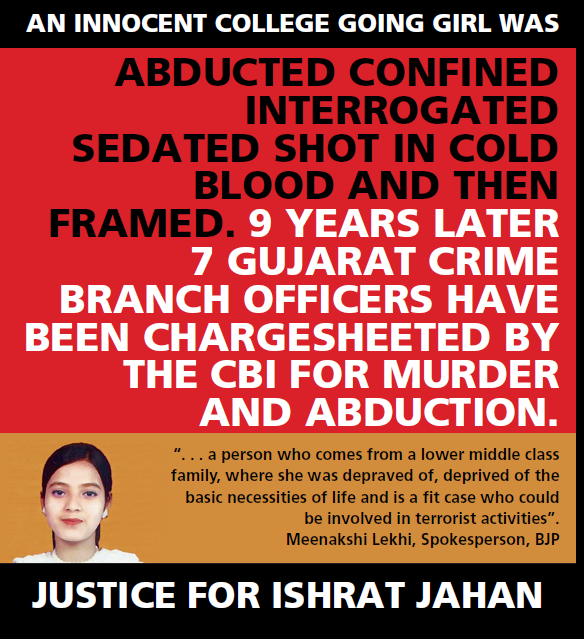
AHMEDABAD: A Special CBI court here on Tuesday rejected the discharge applications of former senior IPS officers of Gujarat – DG Vanzara and NK Amin – who are accused in the 2004 Ishrat Jahan fake encounter case.
Vanzara, who is out on bail, is accused of planning the encounter while retied Superintendent of Police Amin is co-accused. The duo had sought discharge after their then superior officer, retired Director General of Police P P Pandey, was discharged. The encounter was allegedly staged by a joint team of the Gujarat Police and officers of the Intelligence Bureau. Vanzara was Deputy Inspector General of Gujarat at the time of the encounter.
19-year-old Mumbai college girl Ishrat was killed along with her friend Javed Shaikh and two alleged Pakistani nationals, Amjadali Akbarali Rana and Zeeshan Johar, on the outskirts of Ahmedabad on June 15, 2004.
According to The Indian Express report, the court while to discharge Vanzara and Amin said their role was “greater” than that of the retired DGP. “The court asked the CBI whether it wanted to obtain sanction from the state government for prosecuting these two former officers or not. The court said if CBI can’t get sanction under Section 197 of the Code of Criminal Procedure (CrPC) — required for prosecuting a government servant–it should inform the court accordingly. The CBI has not sought the state government’s sanction in this case,” says the report.
The Special CBI Court had on 18th July reserved its verdict for August 4 on the discharge pleas of the two retired police officers D.G. Vanzara and N.K. Amin.
Continuing their arguments, counsel for the two former police officials maintained that they were framed in the case by the Central Bureau of Investigation despite the fact they were not even present at the spot on Ahmedabad outskirts.
They cited the discharge of former Acting Director General of Police P.P. Pandey in the case to buttress their claim.
The mother of Ishrat Jahan, who was killed in the alleged shootout along with three others in a joint operation by Gujarat Police and Intelligence Bureau (IB) officers, opposed the discharge applications.
The counsel for Shamima Kauser asserted that her daughter was abducted, kept in illegal confinement and murdered in cold blood by the Gujarat Police officers and this was “falsely projected as an encounter killing”.
Kauser’s advocate Parvez Pathan argued that the “accused cannot be discharged even before the supplementary charge sheet is placed before the court”.
A supplementary charge sheet is pending with the Special CBI Court that names Intelligence Bureau officials, including its former Special Director Rajinder Kumar.
The arguments on the discharge applications of Vanzara and Amin concluded on Wednesday, following which Special CBI judge J.K. Pandya reserved the order for August 4.
Kauser had pointed out that there are eyewitnesses whose statements have been recorded under Section 164 of the Criminal Procedure Code that establish the roles of senior police officials.
She also objected to the submissions of the accused applicants for “making baseless, defamatory, malicious and motivated aspersions against Ishrat Jahan in a desperate bid to cover up their crime”.
She said in the written submission that she would challenge the discharge order of Pandey in the Gujarat High Court.
Ishrat Jahan, a 19-year-old Mumbai college girl, was killed along with her friend Javed Shaikh and two alleged Pakistani nationals, Amjadali Akbarali Rana and Zeeshan Johar, on June 15, 2004.
In months and years following the Gujarat 2002 riots, several encounters took place in Gujarat. While the state government, then run by Narendra Modi, and the police had claimed those killed in the encounters were terrorists sent to the state to target Modi, families of the victims contested the claims in the court of law. Among those encounters, Isharat Jahan and Sohrabuddin Shaikh encounters had hit national and international headlines. In the Sohrabuddin case, now BJP chief Amit Shah was also among the accused sent to jail. His case was shifted to Mumbai where a CBI court discharged him in December 2014. CBI judge BH Loya was presiding over the case when in the intervening night of 30 Nov and 1 December, he died of heart attack (official reason) at a guest house in Nagpur.
— With inputs from IANS

August 11, 2018 at 4:31 pm
The case is being prolonged for many years. The court should work for a speedy verdict
August 11, 2018 at 4:33 pm
Speedy trial is necessary